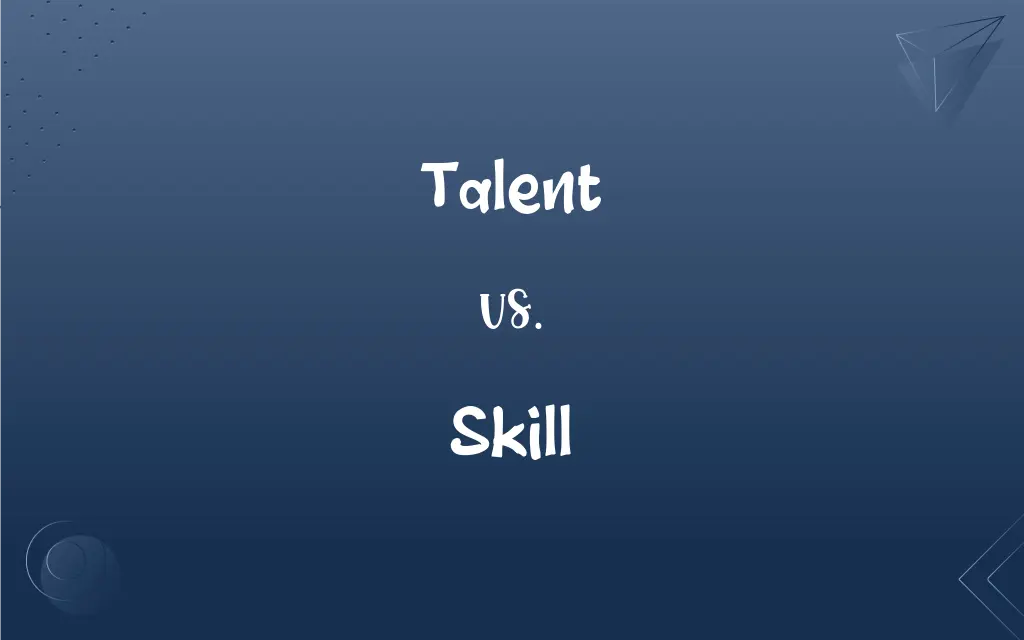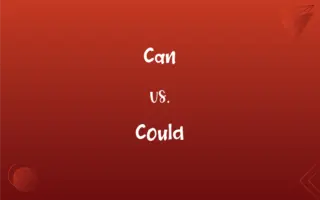Talent vs. Skill: What's the Difference?
Edited by Janet White || By Harlon Moss || Updated on October 16, 2023
Talent is a natural aptitude or ability, while skill is a learned and developed proficiency. Both contribute to performance, but they originate differently.

Key Differences
Talent and skill, although frequently used interchangeably, are distinct terms. Talent generally refers to innate abilities or aptitudes one is born with, while skill denotes proficiencies that are developed over time through practice and education.
For example, someone might have a talent for music, having a natural ear for rhythm and melody. However, that doesn't mean they can play an instrument without learning and practicing. That acquired ability to play an instrument would be a skill.
In the workplace, both talent and skill are valuable. An individual might be naturally good with numbers, an innate talent for numerical reasoning. However, mastering software like Excel to process these numbers efficiently would be a skill.
While talent can provide a foundation, skills can often be honed and refined. Someone might have a natural talent for public speaking due to inherent charisma. Still, the skill to structure a speech, employ rhetorical devices, and use persuasive techniques requires training and experience.
It's important to recognize that while some people might have a head start in certain areas due to talent, skills are accessible to anyone willing to put in the time and effort to learn.
ADVERTISEMENT
Comparison Chart
Origin
Innate, natural ability.
Acquired through learning and practice.
Development
Often present from a young age.
Developed over time.
Flexibility
Hard to alter innate talents.
Skills can be honed, refined, or newly learned.
Basis
Aptitude or genetic predisposition.
Training, practice, and experience.
Measurement
Can be vague and subjective.
Often measurable through tests or performance.
ADVERTISEMENT
Talent and Skill Definitions
Talent
Talent is a natural aptitude or inborn ability.
Even as a child, Mozart displayed an undeniable talent for music.
Skill
Skill represents learned capabilities.
Learning a new language showcases a skill, not a talent.
Talent
Talent can be specific or general in nature.
While some have a broad talent in sports, others might shine specifically in baseball.
Skill
Skill is a proficiency gained through training and experience.
After years of practice, her skill in pottery was evident.
Talent
Talent can be a predisposition towards certain activities.
His talent for storytelling captivated every listener.
Skill
Skill often involves technique or methodology.
The skill of programming involves understanding algorithms and coding languages.
Talent
Talent refers to inherent gifts in certain areas.
Her talent for understanding complex concepts made her excel in physics.
Skill
Skill can be improved and honed over time.
With every painting, his skill as an artist deepened.
Talent
Talent often shows itself without formal training.
Despite never taking lessons, she had a clear talent for dancing.
Skill
Skills can be taught and transferred.
In culinary school, chefs pass on their cooking skills to students.
Talent
A marked innate ability, as for artistic accomplishment
Has a rare talent for music.
Skill
Proficiency, facility, or dexterity that is acquired or developed through training or experience
Painted with great skill.
Talent
Natural endowment or ability of a superior quality
The play has a cast of immense talent.
Skill
A developed talent or ability
Improved his writing skills.
FAQs
Are talents fixed and unchangeable?
Talents are inherent and don't change much, but how they're expressed or utilized can evolve.
Is it easier for someone with talent to develop a related skill?
Often, yes. A talent can provide a foundation, making it easier to acquire related skills.
Are talent and skill the same thing?
No, talent is an innate ability, while skill is learned and developed.
Can someone be born with a skill?
No, skills are acquired through training and experience, whereas talents are innate.
Can skills be developed without any underlying talent?
Absolutely. With dedication and practice, one can develop skills even without natural talent.
How long does it take to develop a skill?
It varies, depending on the skill, the individual, and the amount of effort and training.
Is it more beneficial to have talent or skill?
Both have their advantages. Talent can offer a natural inclination, but skills are versatile and developable.
Can skills diminish over time?
Yes, if not practiced or used, skills can become rusty.
Can skills be innate?
No, skills are developed and refined through experience and practice.
Can training compensate for a lack of talent?
Yes, with dedicated training and practice, one can attain high levels of proficiency even without innate talent.
Do all talents translate into successful careers?
Not always. While talent can provide a foundation, other factors like opportunity, perseverance, and skill development play roles in career success.
How can one improve their skills?
Through consistent practice, education, feedback, and real-world application.
Do all skills require talent?
No, many skills can be acquired through effort and practice without underlying talent.
Can skills be innate or only learned?
Skills are primarily learned and developed, not innate.
Can someone have a talent but lack skills in that area?
Yes, talent doesn't equate to skill. One might have a talent for music but not the skill to play an instrument without training.
How can one identify their talents?
Introspection, feedback from others, and trying various activities can help identify innate talents.
Is every talent valuable?
The value of a talent can be subjective and varies based on context and application.
Can you measure talent?
Talent can be harder to measure compared to skills, which often have clear performance indicators.
Are talents always visible early in life?
Not necessarily. While many talents manifest early, some might become evident later in life.
Can one have multiple talents in different areas?
Absolutely, individuals can have diverse talents across various domains.
About Author
Written by
Harlon MossHarlon is a seasoned quality moderator and accomplished content writer for Difference Wiki. An alumnus of the prestigious University of California, he earned his degree in Computer Science. Leveraging his academic background, Harlon brings a meticulous and informed perspective to his work, ensuring content accuracy and excellence.
Edited by
Janet WhiteJanet White has been an esteemed writer and blogger for Difference Wiki. Holding a Master's degree in Science and Medical Journalism from the prestigious Boston University, she has consistently demonstrated her expertise and passion for her field. When she's not immersed in her work, Janet relishes her time exercising, delving into a good book, and cherishing moments with friends and family.































































